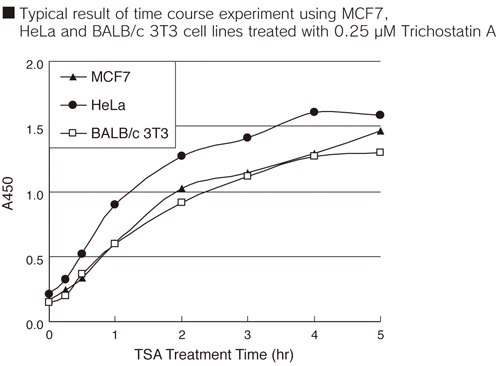CycLex Cellular Histone Acetylation Assay Kit
| Code | Size | Price |
|---|
| MBL-CY-1140 | 2 x 96 Wells | £509.00 |
Quantity:
Prices exclude any Taxes / VAT
Overview
Regulatory Status: RUO
Shipping:
4°C
Storage:
4°C
Images
Documents
Further Information
Applications:
Other - 1) Monitoring the effects of pharmacological agents on histone acetylation in cells.
2) Screening inhibitors of HDAC in cells.
Background:
Acetylation and deacetylation of nucleosomal histones play an important role in the modulation of
chromatin structure, chromatin function and in the regulation of gene expression. Histone
acetyltransferases (HATs) and histone deacetylases (HDACs) are two opposing classes of enzymes,
which tightly control the equilibrium of histone acetylation. An imbalance in the equilibrium of histone
acetylation has been associated with carcinogenesis and cancer progression. So far, a number of
structurally distinct classes of compounds have been identified as HDAC inhibitors including the
short-chain fatty acids, hydroxamates, cyclic tetrapeptides and benzamides. These compounds lead to an
accumulation of acetylated histone proteins both in tumor cells and in normal tissues. HDAC inhibitors
are able to activate differentiation, to arrest the cell cycle in G1 and/or G2, and to induce apoptosis in
transformed or cancer cells. Attention is currently being drawn to molecular mechanisms involving
histone deacetylases. An induction of p21WAF1 and a suppression of angiogenic stimulating factors have
been observed in tumor cells following exposure to HDAC inhibitors. In xenograft models, several
HDAC inhibitors have demonstrated antitumor activity with only few side effects. Several clinical trials
showed that HDAC inhibitors in well-tolerated doses have significant antitumoral activities. A
combination of HDAC inhibitors with differentiation-inducing agents and cytotoxic drugs is an
innovative therapeutic strategy that carries the potential for significant improvements in the treatment of
cancer.
Description:
The CycLex® Cellular Histone Acetylation Assay kit is used for the semi-quantitative measurement of
histone acetylation level in situ by means of cell-based ELISA.
Kit Components:
Microplate, 100X Trichostatin A, 10X Wash Buffer, Blocking Reagent, Primary Antibody Solution(Anti-Acetylated Histone/p53-K382 Monoclonal Antibody TM-5C5), Secondary Antibody Solution (HRP conjugated Anti-Mouse IgG), Substrate Reagent, Stop Solution
Target:
Cellular Histone Acetylation
References
1) Davie, J. R & Chadee, D. N. J. Cell Biochem. (Suppl.) 30-31, 203-213, 1998
2) Kouzarides, T. Curr. Opin. Genet. Dev. 9, 40-84, 1999
3) Fenrick, R. & Hiebert, S.W. J. Cell Biochem. (Suppl.) 30-31, 194-202, 1998
4) Yoshida, M., Horinouchi, S. & Beppu, T. Bioassays 17, 423-430, 1995
5) Richon, V. M. et al. Proc. Natl. Acad. Sci. USA 93, 5705-5708, 1996
6) Richon, V. M. et al. Proc. Natl. Acad. Sci. USA 95 3003-3007, 1998
7) Cohen, L. et al. Proc. AACR 39, 108, abstr. 736, 1998
8) Desai, D., El-Bayoumy, K. & Amin, S. Proc. AACR 40, 2396, abstr. 362, 1999
9) Laherty, C. D., Yang, W-M. et al Cell 89, 349-356, 1997
10) Hassig, C., Fleischer, T. C. et al Cell 89, 341-347, 1997
11) Hoffmann, K., Grosch, G. & Jung, M Nucleic Acids Res. 27, 2057-2058, 1999



